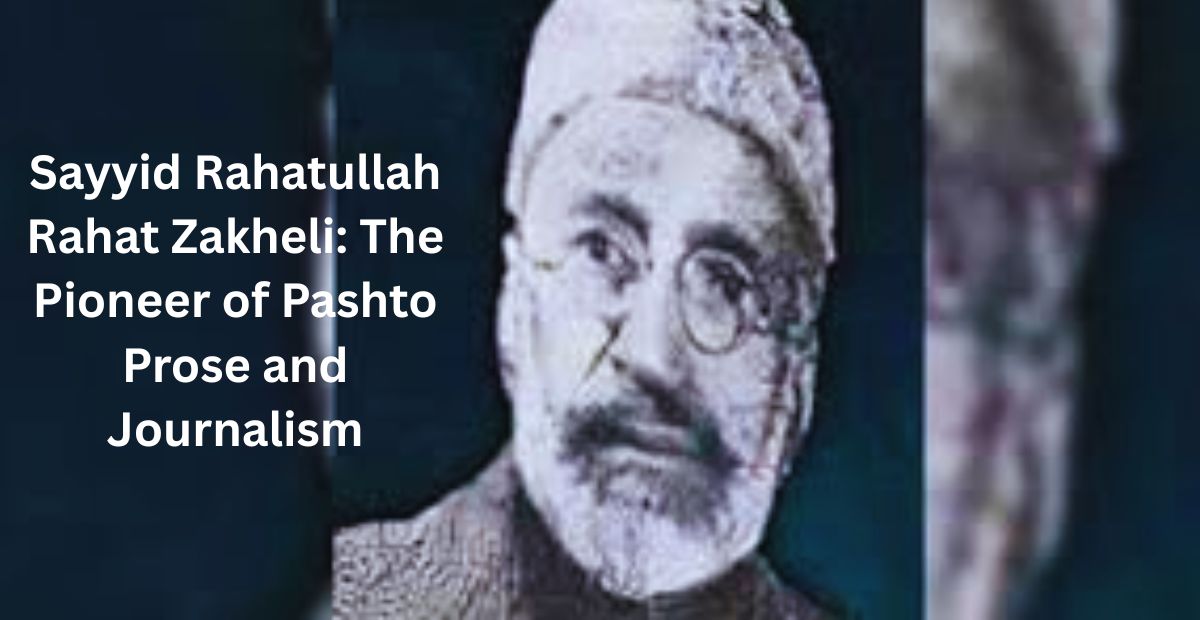Sayyid Rahatullah Rahat Zakheli (Pashto: راحت زاخيلي; 19 February 1883 – 29 May 1963) stands as a monumental figure in the evolution of Pashto literature. A gifted poet, novelist, translator, and journalist, Zakheli played a pivotal role in shaping modern Pashto prose and is widely recognized as the first Pashto novelist. His contributions have left an enduring impact on Pashto language, literature, and journalism, earning him the respected title of Afghani Iqbal.
Early Life and Education
Born in Azakhel Bala, Nowshera, in what is now Pakistan, Zakheli was named Syed Rahatullah by his father, Syed Farihullah, in 1884. His early education was shaped at home, where he was trained in Arabic grammar and syntax, a common practice at the time. Tragedy struck early in his life with the loss of his younger brother, Syed Shafqatullah, which deeply influenced his poetic inclinations.
Zakheli was briefly introduced to Christianity by a British evangelist but chose to remain firmly rooted in Islam, which further shaped his spiritual and intellectual journey.
Literary Contributions and First Pashto Novel
Zakheli’s most celebrated work is “Mah Rukh” (1912), considered by many scholars as the first Pashto novel. In 1917, he authored “Kunda Jinai” (A Widow Girl), widely regarded as the first Pashto short story. These pioneering literary efforts helped lay the foundation for modern Pashto fiction.
In 1911, he launched the first Pashto weekly newspaper titled Afghan, further showcasing his commitment to Pashto literary journalism. His ability to weave narrative with cultural authenticity gained him respect and popularity across Pashto-speaking regions.
Journalism and Translation Work
Rahat Zakheli was not only a novelist but also a dedicated journalist. His newspaper Staray Ma She (“Welcome”) launched in 1930, promoted Pashto language and identity but was soon banned by British colonial authorities due to its bold editorial stance.
In 1948, Zakheli became the editor of the Pashto section of Shahbaz, a prominent newspaper, where he continued his advocacy for Pashto language and culture.
Zakheli also made significant contributions to literary translation. He translated Allama Iqbal’s famous poems “Shikwa” and “Jawab-e-Shikwa” into Pashto, which earned him immense admiration from scholars and the title Afghani Iqbal. In 1923, he undertook the translation of Saadi Shirazi’s “Gulistan” into Pashto, further enriching Pashto literature with classical Persian thought.
Legacy and Scholarly Recognition
Rahat Zakheli passed away on 29 May 1963 and was buried in his birthplace, Azakhel Bala. His poetry continues to resonate, and one of his most famous lines captures his poetic depth:
“که په قبر کې مي زړه هم ټوپ وهلی لېونتوبه زه به هله ستا قایل وې”
“If my heart was beating in the grave, madness, I would have believed you.”
His legacy continues to be studied by scholars:
- Dr. Hanif Khalil highlighted Zakheli’s vast literary and journalistic influence in “The Scholastic and Literary Contribution of Rahat Zakheli.”
- M. Zarin Anzoor reexamined the origins of the Pashto novel and emphasized the strength of Zakheli’s early works.
- Dr. Qadar Wahid argued that Zakheli, not Noor Mohammad Taraki, deserves the title of the first Pashto novelist.
Final Thoughts
Sayyid Rahatullah Rahat Zakheli’s dedication to Pashto language, journalism, and literature has made him a pioneer of modern Pashto prose. His life’s work laid the groundwork for generations of writers, journalists, and thinkers. As a translator, editor, poet, and novelist, Zakheli remains one of the most influential literary figures in Pashto history.
Keywords for SEO:
- Sayyid Rahatullah Rahat Zakheli
- First Pashto novel
- Mah Rukh novel
- Pashto short story
- Pashto journalism
- Afghani Iqbal
- Rahat Zakheli biography
- Pashto literature history
